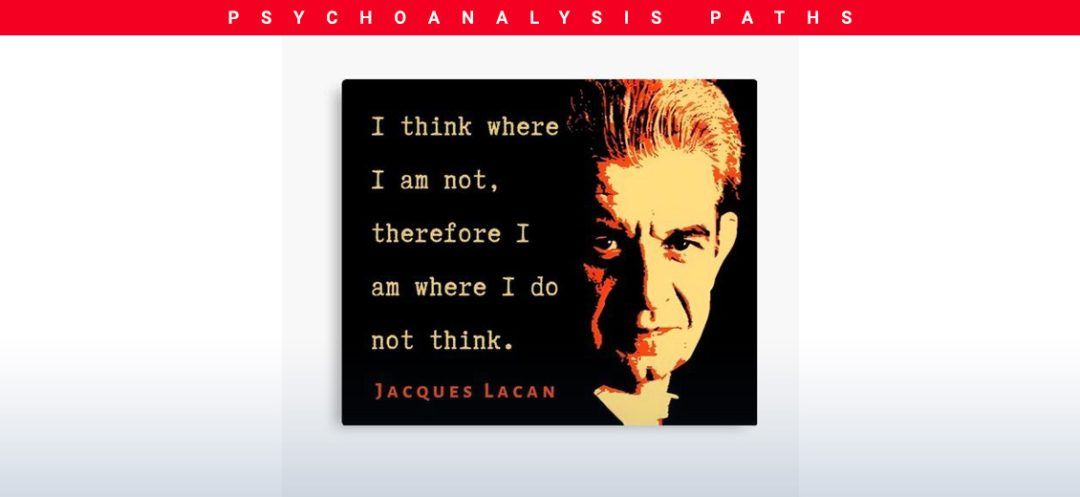
Every week, we invite you to explore a striking quote from a great psychoanalyst to reveal its depth and richness. These lapidary, often provocative formulas open up new perspectives on the intricacies of the human psyche. By deciphering these quotes with rigor and pedagogy, we invite you on a fascinating journey to the heart of psychoanalytic thought to better understand our desires, anxieties and relationships with others. Ready to dive into the deep waters of the unconscious?
“I think where I am not, therefore I am where I do not think.”
This quotation from J. Lacan, taken from his Écrits (1966), appears as paradoxical as it is enigmatic, as we have often seen with his other aphorisms.
This statement subverts Descartes’ famous “I think, therefore I am,” which places reason at the very foundation of all discourse. But can we really claim objectivity and rationality when we express ourselves as a “speaking being”? By this quotation, Lacan, once again, shakes our certainties and questions the very discernment of our identity.
For Descartes, if I think, then I must not doubt my existence. Thus, what founds my being, my identity, is my conscious thought. I am therefore a rational subject, clear about what crosses my psyche. But this was without counting on Freud’s discovery of the unconscious, which Lacan would deepen to radically upset this creed.
From Freud’s topical perspective, he states that the Ego of a subject represents the conscious part of their psyche, the part that interacts with external reality. It is influenced by sociocultural norms, the expectations of others, and the roles society assigns to us.
Lacan would further complicate the approach to human psyche and identity by later asserting, “where the Ego was, the ‘I’ must emerge.” In other words, the individual Ego is merely a semblance, a decoy, an identification with the image by which the other makes me exist and to which I submit. However, a subject cannot be reduced to this image that deprives them of their own subjectivity, unaware that they are governed by their unconscious, by an “I” to be conquered, an “I” linked to language and thus to the unconscious and to the symbolic dimension. This “I” is spoken by a discourse that escapes them, making them a subject of the unconscious, subverted, far removed from standardized sociocultural identity.
Consider the first part of the quote: “I think where I am not.” This means that a fundamental part of my being exists, but where I do not think consciously and rationally because, in reality, my conscious Ego has no place in an unconscious that inhabits and surpasses me.
The second part of the quote: “I am where I do not think:” my true being is not reduced to my reflective consciousness. I am, to myself, another, foreign, a divided being, which reason is powerless to grasp.
It is not an exaggeration to say that, with this formula, Lacan performs a real Copernican revolution, making the conscious Ego a mere satellite orbiting around an incandescent unconscious!
Lacan drives the point home even further with one of his wordplays, for which he is known: “I think therefore I enjoy,” echoing “I am” with “I enjoy,” because for him, the being of the subject, their intimate core, is unconscious enjoyment. In other words, as we have already seen, we are beings of desire, traversed by a quest for satisfaction that largely escapes us, with the sexual infiltrating our psyche much more than we care to admit. Escaping the muzzling that the Ego or the Superego seek to impose on us, the voice of our unconscious is heard through its formations: dreams, symptoms, failed acts, as we have described in our previous article.
When a patient, for example, informs us that in coming to their session they took a different route that delayed them, we invite them to try to grasp the meaning of the message that their unconscious is sending us.
Another example of the emergence of the unconscious in a French politician: In 2021, President Macron, speaking about the COVID-19 epidemic, declares, “we are going to live with the violin,” instead of “we are going to live with the virus.” His slip revealed an attitude that wanted to appear controlled and reassuring about the ravages of the virus, revealing in reality that he is just like his citizens who, cloistered at home, frightened, experience themselves as in prison (in slang, violin means prison).
But then, one might ask, what is the subject for Lacan? It is a being whose eyes are unsealed, a being always in lack, incomplete, who desperately seeks to fill an existential void. Throughout our history, we identify with models that society offers or imposes on us in order to persuade us of a certain consistency. But these are only imaginary crutches that mask our division, our “lack-to-be,” as Lacan says.
As subjects, we are the playthings of our drives, sometimes the puppets of our toxic repetitions. We sometimes find ourselves entangled in patterns of destructive enjoyment, in impossible love relationships.
We are, ultimately, a subject always moving, elusive to oneself as well as to others, a subject who escapes any fixed definition. We believe we are masters of our story, but it precedes and surpasses us. Our conscious, rational thoughts are only the tip of a massive unconscious iceberg.
As is often the case with Freud and Lacan, we are invited to show humility in the face of the complexity of the human psyche, to accept that our “I” does not always have the first nor the last word. It is only by deciphering the messages of our unconscious that we can approach a deeper truth about ourselves.
Psychoanalytic treatment is precisely the opportunity to seize if one wishes to learn to read between the lines of our experiences and thoughts, to hear what our being tells us without our knowledge. In order to realize that the place where I think I am is a normative illusion masking my true being, a place offered to better muzzle my unconscious. Psychoanalysis offers us the possibility, not to strengthen our leveled conscious Ego, but to recognize our subjective division to emancipate ourselves from the deleterious repetitions to which we are sometimes addicted.
Read more





Comments